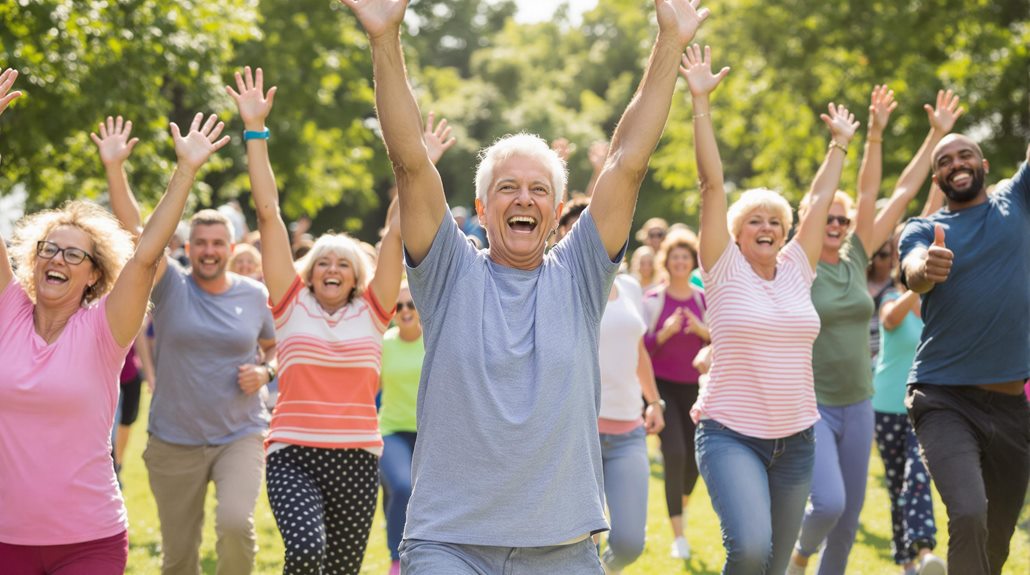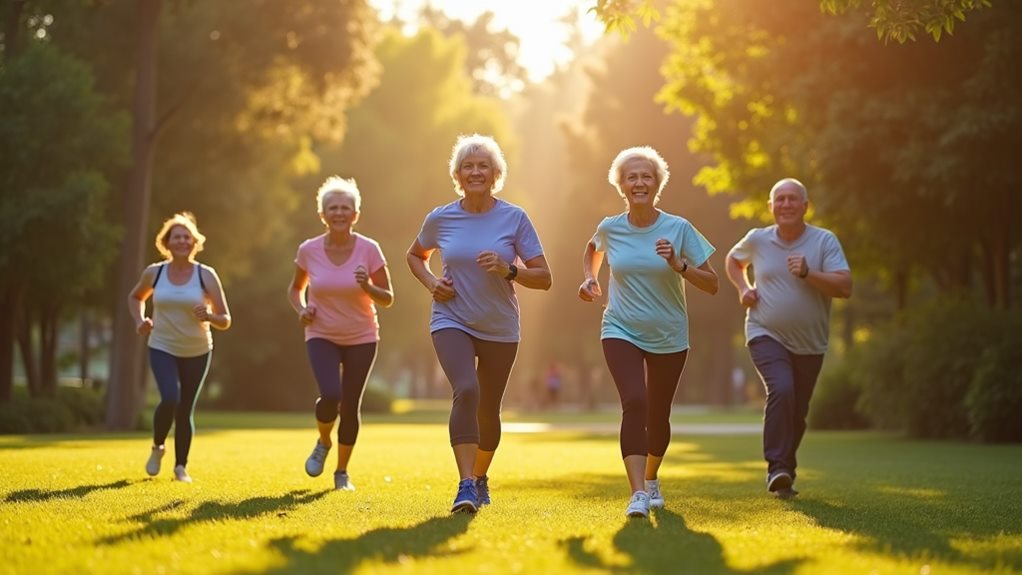
You’ve probably heard countless times that regular exercise is essential, but have you ever thought about why it’s particularly critical for your lifelong health? It’s more than just maintaining a fit physique; consistent exercise can dramatically improve cardiovascular health and mental well-being. Every time you make that choice to be active, you’re reinforcing a foundation for healthy aging. Imagine reducing risks of chronic ailments, maintaining a balanced weight, and even enhancing your sleep quality. What might surprise you is the profound impact these benefits have on your everyday life and longevity. Curious about the deeper connections?
Boosts Cardiovascular Health
Engage in consistent exercise, and you’ll see an immediate boost in your cardiovascular health. Just 10 minutes of moderate physical activity can enhance your heart health and circulation. This means that something as simple as a brisk walk or a short run can lead to significant benefits.
Exercise not only strengthens the cardiovascular system but also builds resilience by improving mental toughness and adaptability. Once you make it a habit, even 60 to 90 minutes of exercise a week can cut your risk of heart disease by up to 50%. The key is to choose activities that effectively challenge your cardiovascular system, like walking or running, which improve heart efficiency and overall fitness.
To make the most of your exercise routine, it’s crucial to prioritize quality over quantity. Focused and effective workouts can deliver substantial cardiovascular benefits without consuming all your free time.
By gradually increasing running time through intervals of walking and running, you can enhance cardiovascular endurance without overstraining your body. This gradual adaptation helps your body build resilience and health over time.
Embrace a balanced approach to exercise, emphasizing moderate activity that suits your current fitness level and consistently incorporating these practices into your lifestyle to sustain long-term cardiovascular health and well-being.
Enhances Mental Well-being

In addition to its physical benefits, regular exercise plays an essential role in enhancing mental well-being. By engaging in regular physical activity, you stimulate brain chemicals that improve mood and markedly reduce feelings of anxiety and depression.
Exercise has been shown to release endorphins, which contribute to both immediate and long-term mental well-being. This natural boost contributes to a positive state of mental well-being. Additionally, physical activity like yoga combines movement with mindfulness, further promoting mental health.
Exercise has been linked to enhanced cognitive function and improved memory, which supports brain health as you go through life. Moreover, regular exercise promotes a sense of accomplishment, boosting self-esteem and improving your perception of body image.
Participating in group exercises introduces valuable social interaction, creating opportunities for connection and shared experiences. This social aspect not only enhances emotional well-being but also reduces feelings of loneliness within your community.
More importantly, consistent physical activity is associated with lower risks of developing mental health disorders. Studies reveal that exercise effectively reduces symptoms of anxiety and depression, functioning as a vital preventive measure for maintaining both your mental and emotional health.
With these notable benefits, incorporating regular physical activity into your routine is a powerful way to support a healthy mind and enhance your overall sense of well-being.
Supports Healthy Aging

Staying active plays an essential role in supporting healthy aging. Engaging in moderate aerobic activity can considerably benefit your overall health by reducing resting heart rates, thereby counteracting age-related heart issues and decreasing the risk of cardiovascular disease.
Regular exercise can also improve intestinal motility, which tends to slow down with age, promoting better digestive health. Furthermore, activities like strength training enhance muscle mass, boosting metabolism and helping to manage weight gain that often comes with aging. For older people, these activities aren’t just about maintaining physical health but also ensuring a longer, healthier life.
All these health benefits make exercise a critical component of a lifestyle that’s geared towards reducing the risk of death from various age-related health conditions. Regular exercise can lower the risk of depression, offering fantastic mental health benefits and improving the quality of life.
Promotes Weight Management

A commitment to regular physical activity is a powerful tool for managing your weight effectively. Regular exercise is good, not just for burning calories but also for boosting your cardiovascular health and metabolism. By engaging in activities that elevate your heart rate, you can efficiently manage your weight and stave off potential health problems like obesity.
Incorporating at least 150 minutes of moderate to vigorous exercise weekly, such as brisk walking or cycling, provides notable benefits of regular activity in controlling weight gain.
Little changes in your daily routine make a big difference. Opting for stairs over elevators or walking during lunch breaks can considerably contribute to weight management. These small adjustments help you reach your activity goals without feeling overwhelmed. Plus, they make it easier to maintain any weight loss you achieve.
Research shows that consistent exercise not only helps you shed pounds but is also effective in keeping them off, forming an essential part of a long-term fitness strategy.
Regular physical activity elevates your metabolic rate, meaning your body burns more calories even at rest. This makes managing your weight simpler over time, reducing the risk of developing obesity-related conditions.
Strengthens Bones and Muscles

Regular physical activity doesn’t just manage your weight; it fortifies your entire musculoskeletal system. By engaging in regular exercise, specifically strength training, you stimulate bone formation and help maintain bone density. These actions considerably lower the risk of osteoporosis and potential fractures as you age.
It’s essential to include at least 150 minutes of physical activity each week to experience the benefits of exercise for bone health. Consistent resistance exercises not only increase bone mineral density by 1-2% annually but also enhance muscle function. This boosts your coordination and balance, vital in preventing falls, particularly among older adults.
The advantages of committing to regular exercise are numerous:
- Improve Muscle Strength: Consistent strength training leads to muscle hypertrophy, enhancing endurance and making daily tasks easier.
- Promote Longevity: Retain muscle mass and strength well into your senior years, contributing to prolonged independence and overall health.
- Reduce Health Care Costs: By lowering the risk of fractures and other injuries, you can decrease your reliance on health care interventions.
Tailoring your exercise routine to focus on both bones and muscles equips you with high levels of physical resilience and empowerment.
Improves Sleep Quality

Exercise has a profound impact on sleep quality, making it easier for you to fall asleep quicker and enjoy a deeper, more restful experience. When you engage in regular physical activity, you set yourself up for better sleep by reducing insomnia symptoms and optimizing your sleep patterns.
According to activity guidelines, incorporating at least 150 minutes of moderate activity into your week can greatly enhance your overall sleep experience. This isn’t just a coincidence; it’s a proven connection between exercise and improved health outcomes.
Research shows that those who follow these recommendations report better sleep quality compared to those who lead sedentary lives. The flow of cardiovascular benefits you gain from regular movement includes improved sleep, which supports recovery, cognitive function, and emotional well-being.
Importantly, mind the timing of your workouts. Aim for morning or afternoon sessions, as evening exercise might interfere with your sleep schedule.
Taking these steps not only improves how you rest but bolsters your general health, too. With better sleep, you have increased resilience against cardiovascular disease and other health issues.
Longevity Boost Through Consistency

The interplay between exercise and longevity is unequivocal, emphasizing that a consistent exercise regimen is crucial for prolonged health and vitality. Regular physical activity not only reduces the risk of chronic diseases such as cardiovascular disease and type 2 diabetes but also greatly lowers mortality risk, paving the pathway to a longer life.
The correlation between higher cardiorespiratory fitness and extended life expectancy underscores the universal importance of maintaining an active lifestyle across all age groups. Additionally, the mental and cognitive benefits derived from consistent exercise routines contribute profoundly to enhanced quality of life and longevity.
Throughout this article, we’ve explored the multifaceted benefits of regular physical activity for lifelong health. Whether through moderate or vigorous exercise, meeting the recommended activity levels of 150-300 minutes of moderate or 75-150 minutes of vigorous exercise per week maximizes health benefits, fostering both physical and mental well-being.
Consistent exercise provides a thorough boost to overall health with cognitive and mental well-being enhancements closely linked to extended life spans. The evidence is compelling: consistent, deliberate effort in maintaining an active lifestyle is an investment in one’s own future, offering both immediate and long-term benefits.
Prioritizing physical activity helps cultivate a robust foundation upon which a healthier and more fulfilling life can prosper. As science continues to affirm the positive impacts of regular exercise, embracing consistency in physical activities emerges as an essential part of living a life of vigor and resilience, ensuring a future underscored by health and longevity.














